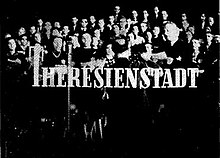| Theresienstadt | |
|---|---|
 | |
| Directed by |
|
| Written by | Kurt Gerron using a draft by Jindřich Weil |
| Produced by | Karel Pečený (Aktualita Prag) |
| Starring | Theresienstadt prisoners |
| Cinematography |
|
| Edited by | Ivan Frič |
| Music by | Various pieces by Jewish composers selected by Peter Deutsch |
| Distributed by | Schutzstaffel |
Release date |
|
Running time | c. 90 minutes (surviving footage: 20 minutes) |
| Country | Nazi Germany |
| Language | German |
| Budget | 35,000 Reichsmarks |
Theresienstadt. Ein Dokumentarfilm aus dem jüdischen Siedlungsgebiet ("Theresienstadt: A Documentary Film from the Jewish Settlement Area"), unofficially Der Führer schenkt den Juden eine Stadt ("The Führer Gives a City to the Jews"), was a black-and-white projected Nazi propaganda film. It was directed by the German Jewish prisoner Kurt Gerron and the Czech filmmaker Karel Pečený under close SS supervision in the Theresienstadt concentration camp, and edited by Pečený's company, Aktualita. Filmed mostly in the autumn of 1944, it was completed on 28 March 1945 and screened privately four times. After the war, the film was lost but about twenty minutes of footage was later rediscovered in various archives.
Unlike other Nazi propaganda films, which were under the control of Joseph Goebbels' Ministry of Propaganda, Theresienstadt was conceived and paid for by the Jewish Affairs department of the Protectorate of Bohemia and Moravia, at the initiative of Hans Günther. The film, which displayed supposedly happy and healthy Jews, was part of a larger Nazi program to use Theresienstadt as a tool to discredit reports of the genocide of Jews reaching the Western Allies and neutral countries. However, it was not widely distributed and did not have the opportunity to influence public opinion.